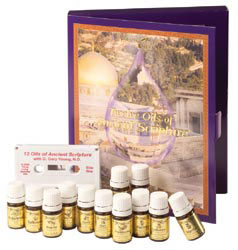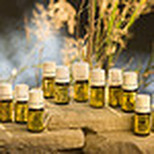12 OILS OF SCRIPTURE

In the Twelve Oils of Ancient Scripture collection, Gary Young has gathered the
12 most significant oils found in the Bible. His wish is that you savor and enjoy these precious and pure essential oils with their beautiful fragrances and
intriguing histories.
The oils and aromatics mentioned in the Bible were more valuable than gold and silver. Israel’s King Hezekiah kept "the spices, and the precious ointment" (2 Kings 20:13) together with silver and gold in the royal treasure chamber. The Greek historian Pliny the elder documented the stringent security measures taken in the processing of frankincense at Alexandria, Egypt: "Good heavens! No vigilance is sufficient to guard factories ... before [the workers] are allowed to leave the premises they have to take off all their clothes."
Merriam-Webster's Collegiate Dictionary defines anoint as 'to apply oil to as a sacred rite, esp. for consecration.' It has been suggested that the holy anointing oil described in Exodus 30:23-25 is a symbol of being set apart for special purposes in God's kingdom. People and objects were anointed throughout the Bible: Aaron and his sons were anointed priests, the Tabernacle and all of its vessels were anointed before being put into service, and Saul and David were anointed to be kings. The Hebrew word for Messiah, Moschiach, means "Anointed One." Jesus Christ was twice anointed with oil of spikenard, which was so expensive that Judas was indignant that it wasn't sold to raise money for the poor.
God mandated that the anointing oil be fragrant when He instructed Moses to add spices and fragrant oils to the base of pure olive oil. Psalm 45 informs us that the garments of the Messiah are fragrant with myrrh, aloes, and cassia. In one Bible translation of Philippians 4:18, Paul described gifts given as "a fragrant aroma, an acceptable sacrifice, well-pleasing to God."
Incense was offered twice daily in the Tabernacle and later in the temple in Jerusalem. In Proverbs 27:9 we're told that "ointment and perfume rejoice the heart." The New Testament suggests that incense offering represents the prayers of saints. In Revelation 5:8, "four beasts and four and twenty elders fell down before the Lamb, having every one of them harps, and golden vials full of odours, which are the prayers of saints," the King James translators chose to translate the Greek word "thumiama" as "odours" rather than "incense." According to Strong's
Exhaustive Concordance of the Bible, "thumiama" (Strong's #2368) means "fragrant powder burnt in religious services." (See also Revelation 8: 3-4.) The ritual use of incense represented God's power over life and death in Numbers 16:46-48 wherein the High Priest Aaron walked through the congregation with it, stopping a deadly plague.
12 most significant oils found in the Bible. His wish is that you savor and enjoy these precious and pure essential oils with their beautiful fragrances and
intriguing histories.
The oils and aromatics mentioned in the Bible were more valuable than gold and silver. Israel’s King Hezekiah kept "the spices, and the precious ointment" (2 Kings 20:13) together with silver and gold in the royal treasure chamber. The Greek historian Pliny the elder documented the stringent security measures taken in the processing of frankincense at Alexandria, Egypt: "Good heavens! No vigilance is sufficient to guard factories ... before [the workers] are allowed to leave the premises they have to take off all their clothes."
Merriam-Webster's Collegiate Dictionary defines anoint as 'to apply oil to as a sacred rite, esp. for consecration.' It has been suggested that the holy anointing oil described in Exodus 30:23-25 is a symbol of being set apart for special purposes in God's kingdom. People and objects were anointed throughout the Bible: Aaron and his sons were anointed priests, the Tabernacle and all of its vessels were anointed before being put into service, and Saul and David were anointed to be kings. The Hebrew word for Messiah, Moschiach, means "Anointed One." Jesus Christ was twice anointed with oil of spikenard, which was so expensive that Judas was indignant that it wasn't sold to raise money for the poor.
God mandated that the anointing oil be fragrant when He instructed Moses to add spices and fragrant oils to the base of pure olive oil. Psalm 45 informs us that the garments of the Messiah are fragrant with myrrh, aloes, and cassia. In one Bible translation of Philippians 4:18, Paul described gifts given as "a fragrant aroma, an acceptable sacrifice, well-pleasing to God."
Incense was offered twice daily in the Tabernacle and later in the temple in Jerusalem. In Proverbs 27:9 we're told that "ointment and perfume rejoice the heart." The New Testament suggests that incense offering represents the prayers of saints. In Revelation 5:8, "four beasts and four and twenty elders fell down before the Lamb, having every one of them harps, and golden vials full of odours, which are the prayers of saints," the King James translators chose to translate the Greek word "thumiama" as "odours" rather than "incense." According to Strong's
Exhaustive Concordance of the Bible, "thumiama" (Strong's #2368) means "fragrant powder burnt in religious services." (See also Revelation 8: 3-4.) The ritual use of incense represented God's power over life and death in Numbers 16:46-48 wherein the High Priest Aaron walked through the congregation with it, stopping a deadly plague.
The Twelve Oils of Ancient ScriptureTM Kit contains the twelve most significant oils found in the Bible. Gary Young draws on his travels to biblical lands and explains the twelve oils in the cassette included with the oils.
Contains: Twelve Single Oils (5ml bottles):
Aloes/sandalwood (Santalum album), cassia (Cinnamomum cassia), cedarwood (Cedrus atlantica), cypress (Cupressus sempervirens), frankincense (Olibanum -- Boswellia carteri), galbanum (Ferula gummosa), hyssop (Hyssopus officinalis), myrrh (Commiphora myrrha), myrtle (Myrtus communis), onycha (pronounced oh-nigh-kah, a very thick oil, remove the plastic orifice and warm the bottle in your hand so that the oil will flow -- Styrax benzoin), Rose of Sharon/cistus (Labdanum -- Cistus ladanifer), and spikenard (Nardostachys jatamansi).
Learn more or order the 12 Oils of Scripture from Young Living Essential Oils.
Contains: Twelve Single Oils (5ml bottles):
Aloes/sandalwood (Santalum album), cassia (Cinnamomum cassia), cedarwood (Cedrus atlantica), cypress (Cupressus sempervirens), frankincense (Olibanum -- Boswellia carteri), galbanum (Ferula gummosa), hyssop (Hyssopus officinalis), myrrh (Commiphora myrrha), myrtle (Myrtus communis), onycha (pronounced oh-nigh-kah, a very thick oil, remove the plastic orifice and warm the bottle in your hand so that the oil will flow -- Styrax benzoin), Rose of Sharon/cistus (Labdanum -- Cistus ladanifer), and spikenard (Nardostachys jatamansi).
Learn more or order the 12 Oils of Scripture from Young Living Essential Oils.
Brief Description of the 12 essential oils

Cedarwood:
Ancient uses - ritual cleansing, cosmetics, embalming, skin problems.
Modern uses – insect repellent, hair loss, skin disorders (acne, psoriasis). Enhances deep sleep, emotional releases, clearing to mind and brain.
Cinnamon:
Ancient uses – Holy anointing oils, perfume.
Modern uses - one of the most powerful antibacterial, antiviral oils of all.
Cassia:
Ancient uses – ingredient in Moses’Holy Anointing Oil.
Modern uses - antibacterial, antiviral, antifungal, immune system builder.
Sandalwood:
Ancient uses – assistance in meditation; aphrodisiac; embalming.
Modern uses - for skin care,enhances deep sleep, relieves menstrual problems helps overcome urinary tract infections; for cancer and anti-aging.
Cypress:
Ancient uses – arthritis, laryngitis, reducing scar tissue, cramps.
Modern uses - cardiovascular,emotionally beneficial: eases feeling of loss, promotes feeling of security and grounding; relieve menstrual pains and menopausal symptoms.
Galbanum:
Ancient uses – Holy anointing oils, various medicines, perfume, spiritually
uplifting yet grounding, pain relief, spasms and cramps, diuretic.
Modern uses - abscesses, acne, asthma, chronic coughs, cramps, indigestion, muscular aches and pains, scar tissue, wrinkles, wounds, emotionally balancing.
Hyssop:
Ancient uses – spiritually uplifting, meditation, spiritual purification, various medicines, respiratory relief, decongestant, expectorant.
Modern uses – relieve anxiety, arthritis, asthma, respiratory infections,
parasites, sore throats, cuts and wounds.
Onycha:
Ancient uses – perfume, comforting,soothing, uplifting, an ointment to heal skin wounds.
Modern uses – stimulates renal output, used for colic, flatulence, constipation, may help control blood sugar levels. Inhaled for sinusitis, colds, coughs and sore throats
& wounds.
Rose of Sharon:
Ancient uses – elevating moods, perfume.
Modern uses - anti-hemorrhaging agent, anti-inflammatory, anti-infectious, cell
regenerating, calming to nerves.
Spikenard:
Ancient uses – perfumes, medicines, skin tonic, incense, mood enhancer.
Modern uses allergies, migraine, nausea, cardiovascular support, tachycardia, relaxing, soothing emotionally calming, antidepressant.
Myrrh:
Ancient uses – used during labor to massage on perineum to facilitate
stretching, after childbirth to prevent or remove abdominal stretch marks; skin
conditions, oral hygiene and embalming.
Modern uses –anti-infectious, antiviral, anti-parasitic, anti-inflammatory,
support immune system, hormone-like, balancing to thyroid.
Frankincense:
Ancient uses –used to anoint the newborn sons of kings and priests; holy
anointing oil, cure-all, embalming, perfume.
Modern uses:–cancer, depression, allergies, headaches, bronchitis, herpes, tonsillitis, warts, brain damage, and massive head injuries.
Ancient uses - ritual cleansing, cosmetics, embalming, skin problems.
Modern uses – insect repellent, hair loss, skin disorders (acne, psoriasis). Enhances deep sleep, emotional releases, clearing to mind and brain.
Cinnamon:
Ancient uses – Holy anointing oils, perfume.
Modern uses - one of the most powerful antibacterial, antiviral oils of all.
Cassia:
Ancient uses – ingredient in Moses’Holy Anointing Oil.
Modern uses - antibacterial, antiviral, antifungal, immune system builder.
Sandalwood:
Ancient uses – assistance in meditation; aphrodisiac; embalming.
Modern uses - for skin care,enhances deep sleep, relieves menstrual problems helps overcome urinary tract infections; for cancer and anti-aging.
Cypress:
Ancient uses – arthritis, laryngitis, reducing scar tissue, cramps.
Modern uses - cardiovascular,emotionally beneficial: eases feeling of loss, promotes feeling of security and grounding; relieve menstrual pains and menopausal symptoms.
Galbanum:
Ancient uses – Holy anointing oils, various medicines, perfume, spiritually
uplifting yet grounding, pain relief, spasms and cramps, diuretic.
Modern uses - abscesses, acne, asthma, chronic coughs, cramps, indigestion, muscular aches and pains, scar tissue, wrinkles, wounds, emotionally balancing.
Hyssop:
Ancient uses – spiritually uplifting, meditation, spiritual purification, various medicines, respiratory relief, decongestant, expectorant.
Modern uses – relieve anxiety, arthritis, asthma, respiratory infections,
parasites, sore throats, cuts and wounds.
Onycha:
Ancient uses – perfume, comforting,soothing, uplifting, an ointment to heal skin wounds.
Modern uses – stimulates renal output, used for colic, flatulence, constipation, may help control blood sugar levels. Inhaled for sinusitis, colds, coughs and sore throats
& wounds.
Rose of Sharon:
Ancient uses – elevating moods, perfume.
Modern uses - anti-hemorrhaging agent, anti-inflammatory, anti-infectious, cell
regenerating, calming to nerves.
Spikenard:
Ancient uses – perfumes, medicines, skin tonic, incense, mood enhancer.
Modern uses allergies, migraine, nausea, cardiovascular support, tachycardia, relaxing, soothing emotionally calming, antidepressant.
Myrrh:
Ancient uses – used during labor to massage on perineum to facilitate
stretching, after childbirth to prevent or remove abdominal stretch marks; skin
conditions, oral hygiene and embalming.
Modern uses –anti-infectious, antiviral, anti-parasitic, anti-inflammatory,
support immune system, hormone-like, balancing to thyroid.
Frankincense:
Ancient uses –used to anoint the newborn sons of kings and priests; holy
anointing oil, cure-all, embalming, perfume.
Modern uses:–cancer, depression, allergies, headaches, bronchitis, herpes, tonsillitis, warts, brain damage, and massive head injuries.
